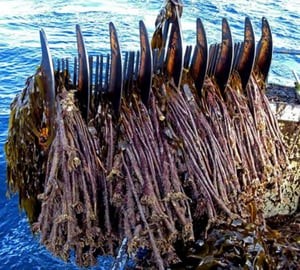It seems that the subtidal rocky environment of Scotland is to be exposed to the destructive processes of kelp harvesting, and unlike a recent Irish proposal at least there is some semblance of environmental management in the form of a scoping report. The ‘consultation’ on this is now closed but I wonder why my Scottish contacts didn’t pick this up earlier? We have comprehensively destroyed vast areas of sediment seabed and now we seem to be applying the same logic to the nearshore rocky environment.
Guardian ‘Kelp dredging proposal criticised by Scottish conservationists
‘Kelp habitats are vital ecosystems that absorb the power of waves along stormy coasts, lock up millions of tonnes of carbon every year and provide shelter for hundreds of species,’ said Calum Duncan of the Marine Conservation Society.
A proposal to mechanically dredge kelp forests off the coast of Scotland has led to an outcry from conservationists, who say it would destroy local ecosystems. Ayr-based company Marine Biopolymers has approached Marine Scotland to apply for a licence to use a comb-like device that pulls entire kelp plants from the bed. In order to inform the environmental appraisal required by Marine Scotland, Marine Biopolymers has published a report describing the potential environmental impacts to be researched further for a full assessment.

Rake used to harvest L. hyperborea The harvesting technique proposed by MBL is similar to that used in Norway for L. hyperborea. It comprises use of a comb-like harvesting head (3-4 m wide) that is situated within a curved frame. It is deployed from a vessel, and trawled through the kelp bed at approximately 0.5 m above the rock substrate at a speed of around 3 knots. Photograph: Steen, H., Moy, F.E., Bodvin, T./Institute of Marine Research
Public comment on this report is open until Friday 24 August, and various stakeholders have expressed concern over the proposals. “Kelp habitats are vital ecosystems that absorb the power of waves along stormy coasts, lock up millions of tonnes of carbon every year and provide shelter for hundreds of species,” said Calum Duncan of the Marine Conservation Society.
“This scoping report is only the first stage of an extensive consultation process,” said a statement issued by Marine Biopolymers. “The next stage is the full environmental survey, which will be carried out by internationally renowned scientists.”
The report describes plans to harvest up to 34,000 tonnes of kelp per year, an estimated 0.15% of the kelp in Scotland. Proposed sustainability measures include plans to avoid harvesting young kelp, and to leave harvested beds to recover for five years before returning.
However, these proposals may not be truly sustainable, according to Dan Smale, an ecologist at the Marine Biological Association. “I’m not opposed to wild kelp harvesting if it’s managed appropriately, and it’s been shown from both Norway and France that to an extent it can be done sustainably,” he said. “My problem here is that we don’t have enough baseline ecological information or understanding of how our systems work [in Scotland].” The recovery rate of five years may be insufficient not only for the kelp itself to recover, but also for associated animal communities to return, he explained.’ Click here to read more